I often drive by the Hospital as I go back and forth from home to work. And for the last couple of years now they have had this big digital sign facing Government and Carmi. The sign flashes several messages but the predominant theme is leave your legacy, support the Hospital Foundation.
 Sometimes it congratulates big donors but mostly it serves as a reminder that something special is about to happen at the Hospital and they need the message to reach the community for its support.
Sometimes it congratulates big donors but mostly it serves as a reminder that something special is about to happen at the Hospital and they need the message to reach the community for its support.
Soon a new tower will be built and more life enhancing and lifesaving procedures will proceed from it. But it seems as though it can only happen if someone leaves a financial legacy, and in fact it’ll take many ‘someones’ in partnership to accomplish this undertaking. But truth be known, even with the very generous support of individual donors, this massive project wouldn’t have gotten off the ground. So individual contributors are invited to be in partnership with those who provide the majority stake to leave a legacy this size.
According to info I found on Interior Health’s website: “The total budget for the project is $325-million. The Okanagan-Similkameen Regional Hospital District is providing $122-million, the South Okanagan Similkameen Medical Foundation is contributing $20-million (I presume that would be those donors I just spoke of) , and the provincial portion is $183-million.” (https://www.interiorhealth.ca/sites/BuildingPatientCare/PRH/Pages/default.aspx ).
The hours that have gone into planning and preparing for this substantial project are immense. It takes vision and stick-to-itiveness to cut through miles of red tape and political maneuvering before the first shovel of dirt is moved and many more hours before patients walk in the door. But the legacy left behind is worth it. Isn’t it?
Will it have eternal consequences both for the donor and for the recipient? This remains to be seen.
Last week Jimmy spoke about a different legacy that you and I have opportunity to leave for the next generation. God invites us as His partners in building this legacy that has spanned generations and will certainly last for all eternity.
Today’s passage in HIStory tells about the starting phase that began nearly four thousand years ago and has already shaped the entire world. Yet from the start the man who was selected to cast the vision and begin the project was reluctant, or perhaps felt inadequate to take on the task. Let’s see how the author of the first five books of the Bible responded to the call of God in his life and take courage from HIStory when it’s our turn to leave a legacy for God.
If you have your bible or tablet along turn with me to Exodus 3:1-12 and let’s see of God shaped this part of HIStory.
“Now Moses was tending the flock of Jethro his father-in-law, the priest of Midian, and he led the flock to the far side of the desert and came to Horeb, the mountain of God. There the angel of the LORD appeared to him in flames of fire from within a bush. Moses saw that though the bush was on fire it did not burn up. So Moses thought, “I will go over and see this strange sight–why the bush does not burn up.” When the LORD saw that he had gone over to look, God called to him from within the bush, “Moses! Moses!” And Moses said, “Here I am.” “Do not come any closer,” God said. “Take off your sandals, for the place where you are standing is holy ground.” Then he said, “I am the God of your father, the God of Abraham, the God of Isaac and the God of Jacob.” At this, Moses hid his face, because he was afraid to look at God. The LORD said, “I have indeed seen the misery of my people in Egypt. I have heard them crying out because of their slave drivers, and I am concerned about their suffering. So I have come down to rescue them from the hand of the Egyptians and to bring them up out of that land into a good and spacious land, a land flowing with milk and honey–the home of the Canaanites, Hittites, Amorites, Perizzites, Hivites and Jebusites. And now the cry of the Israelites has reached me, and I have seen the way the Egyptians are oppressing them. So now, go. I am sending you to Pharaoh to bring my people the Israelites out of Egypt.” But Moses said to God, “Who am I, that I should go to Pharaoh and bring the Israelites out of Egypt?” And God said, “I will be with you. And this will be the sign to you that it is I who have sent you: When you have brought the people out of Egypt, you will worship God on this mountain.” Exodus 3:1-12 (NIV)
 So Moses, our man of the hour, was a simple sheep herder was he? He had taken his flock across the desert up a mountain when he saw this unusual site. Oppss! Scratch that.
So Moses, our man of the hour, was a simple sheep herder was he? He had taken his flock across the desert up a mountain when he saw this unusual site. Oppss! Scratch that.
It wasn’t his flock that Moses was looking after; it was his father-in-law’s, a man named Jethro who was the priest at Midian according to verse 1.
But wait, wasn’t Moses father-in-law was actually named Reuel according to Exodus chapter 2:18. So is our author a little forgetful? Or could this be a case of Hebrew words having more than one meaning?
According to the Believers Bible Commentary: “The term designating male in-laws is nonspecific. The term referred to a woman’s male relatives and could be used for her father, brother or even grandfather. Most solutions take account of this. Perhaps Reuel is the grandfather head of the clan, Jethro is the father of Zipporah and technically the father-in-law of Moses, and Hobab is the brother-in-law of Moses, Jethro’s son. Alternatively, Jethro and Hobab could both be brothers-in-law, and Reuel the father” (BBC:Exodus3).
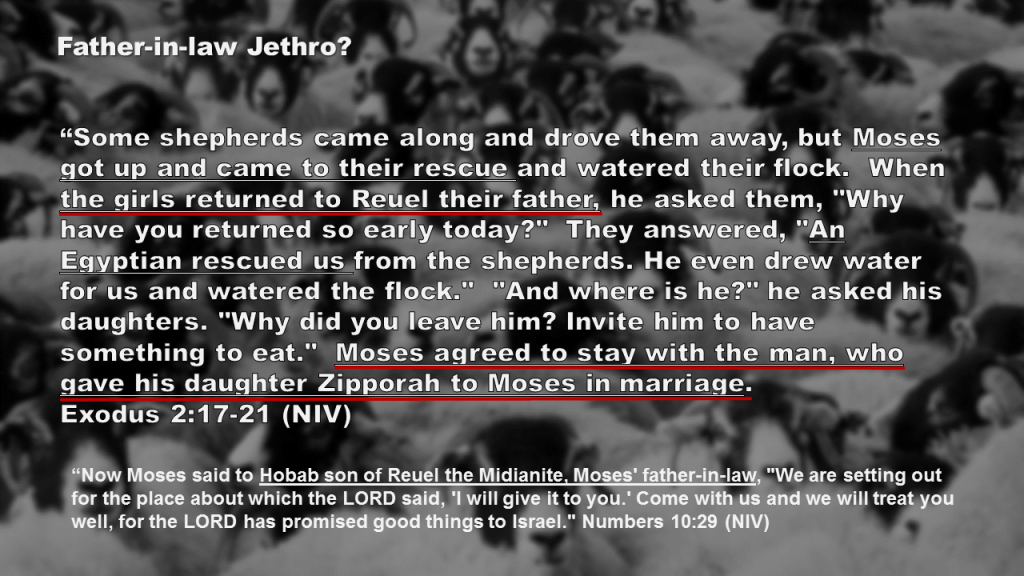 So at best we have Moses looking after sheep that belong to a male relative on his wife’s side of the family as this chapter begins. And that relative, who is likely his father-in-law, as we’ll see much later in Numbers chapter 10, gave him his wife, Zipporah for rescuing his daughters according to chapter 2, and clearly Moses also got the job shepherding dad’s sheep according to chapter 3.
So at best we have Moses looking after sheep that belong to a male relative on his wife’s side of the family as this chapter begins. And that relative, who is likely his father-in-law, as we’ll see much later in Numbers chapter 10, gave him his wife, Zipporah for rescuing his daughters according to chapter 2, and clearly Moses also got the job shepherding dad’s sheep according to chapter 3.
You see, if we just went from close context to chapter 3 verse 1 we might think that’s how this story goes. But how does a shepherd end up the author of so many Old Testament books?
The story of Moses birth and divine deliverance from the Nile by Pharoah’s daughter, not Pharoah’s wife as the Qur’an calls her, shows that Moses was favoured by God long before this trip up the mountain.
And in case you think this is a young or middle-aged Moses that scales mountains with sheep and gazes upon the bush aflame, even a little cross-referencing tells us that He was likely 80 years young. 
So we have this octogenarian out on the mountain plateau herding sheep. He may have thought his years of influence were behind him but God made it so that the most influential ones were yet to come.
Moses suddenly notices something strange, weird really. A bush on fire but not consumed.
Some through the ages have made light of the obvious fact that this was no ordinary bush fire. They say things like, “the light shining on red leaves gave the bush its glowing features”. Others have tried to paint similar natural reasons for this phenomena. But clearly such an explanation doesn’t make much sense given what Moses himself thought. In verse 3 it says, “I will go over and see this strange sight–why the bush does not burn up.” Exodus 3:3 (NIV).
 I’m sure even Moses would have wondered what natural causes could create the illusion of fire without consumption. And if that were the end of the story then you might begin to agree that a natural explanation could be found. But clearly red leaves and sunshine cannot call out your name.
I’m sure even Moses would have wondered what natural causes could create the illusion of fire without consumption. And if that were the end of the story then you might begin to agree that a natural explanation could be found. But clearly red leaves and sunshine cannot call out your name.
And did you notice? The bush called not once but twice? Verse 4 says, “When the LORD saw that Moses had gone over to look, God called to him from within the bush, “Moses! Moses!” Exodus 3:4 (NIV). Why twice you may be wondering?
Do you ever find yourself so engrossed with something that you aren’t really listening? And you don’t hear something even though there is no audio distraction or other noise preventing you from hearing? That’s how strange and engrossing this burning bush was to Moses. His focus was so fixed that the first time his name was spoken he hardly noticed …but the second time! God had gotten his attention. And get this…Moses actually answered a talking bush!
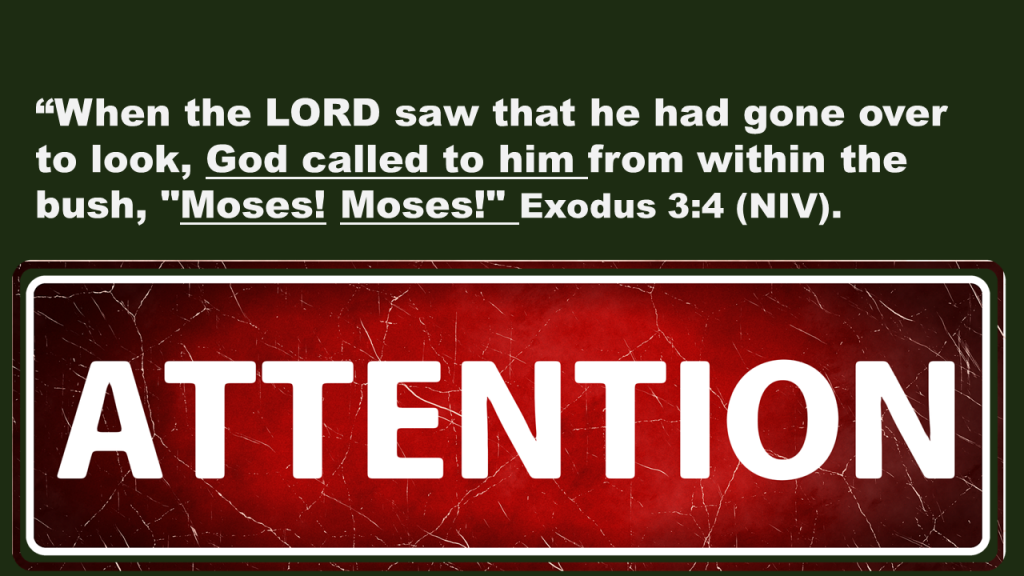 Seriously! Moses actually answered back, “Here I am” (4). To a bush! What did he think? That the bush had no eyes, couldn’t see where he was? Here I Am? What king of answer is that?
Seriously! Moses actually answered back, “Here I am” (4). To a bush! What did he think? That the bush had no eyes, couldn’t see where he was? Here I Am? What king of answer is that?
Well at least God had some of his attention. But what was it that God said next?
“Do not come any closer,” God said. “Take off your sandals, for the place where you are standing is holy ground.” Exodus 3:5 (NIV). Why on earth did He say that? Is not the whole earth the Lord’s footstool? Was it not He who created everything in it including mankind? What was special about this piece of real estate?
Like last week’s message this part of HIStory defines a boundary for mankind. God was establishing HIS authority in Moses life. “Take off your sandals you are standing on holy ground” (5). But did God truly have Moses attention? Did Moses take his sandals off? Did he actually begin with obedience to God’s direct command? What do you think?
Come on Wednesday or join in on Whatsapp and let’s talk. This much I can say for today, I know when Joshua was told the same thing by a messenger of God his response was immediate.
The messenger of the Lord “ said, “… I indeed come now as captain of the host of the LORD.” And Joshua fell on his face to the earth, and bowed down, and said to him, “What has my lord to say to his servant?” The captain of the LORD’S host said to Joshua, “Remove your sandals from your feet, for the place where you are standing is holy.” And Joshua did so.” (Joshua 5:14-15).
But why did Moses need to remove his sandals? Could it be so that he couldn’t run away to fast? J It may have been Holy Ground but the rocks around there must have been hard on the feet.
Seriously now, God didn’t give him a chance to run before laying out why this sudden burst into human domain had come about.
In verses 6-10 we read, “Then he said, “I am the God of your father, the God of Abraham, the God of Isaac and the God of Jacob.”
God reminded him of what he already knew, he was part of a chosen lineage.
Perhaps Moses being 80 years young thought he was past his prime to do anything of significance but God reminds him of this covenant to his fathers. In fact we see it again and again throughout the Word. This reference to relatives long since buried goes back to the covenant God made with Abraham.
In Genesis 17:7 we read, “I will establish my covenant as an everlasting covenant between me and you and your descendants after you for the generations to come, to be your God and the God of your descendants after you.” Including but not limited to this one named Moses.
But even before him back in Genesis 26, God spoke to Isaac, a son of Abraham, “I am the God of your father Abraham. Do not be afraid, for I am with you; I will bless you and will increase the number of your descendants for the sake of my servant Abraham.” Genesis 26:24 (NIV)
And remember we saw a similar thing with Jacob too the week before last. This constant refrain continues until the LORD Jesus Christ, (also a descendant of Abraham) who not only uses it as a reminder but as a proof of the resurrection of the dead. In Matthew 22 Jesus is quoted as saying, “… about the resurrection of the dead–have you not read what God said to you, ‘I am the God of Abraham, the God of Isaac, and the God of Jacob’? He is not the God of the dead but of the living.” Matthew 22:31-32 (NIV). So this greeting is not like “hey, how’s it going? Or “How are you?” God is reminding Moses he is a part of the chosen ones.
As Moses hears this reminder his response is immediate.
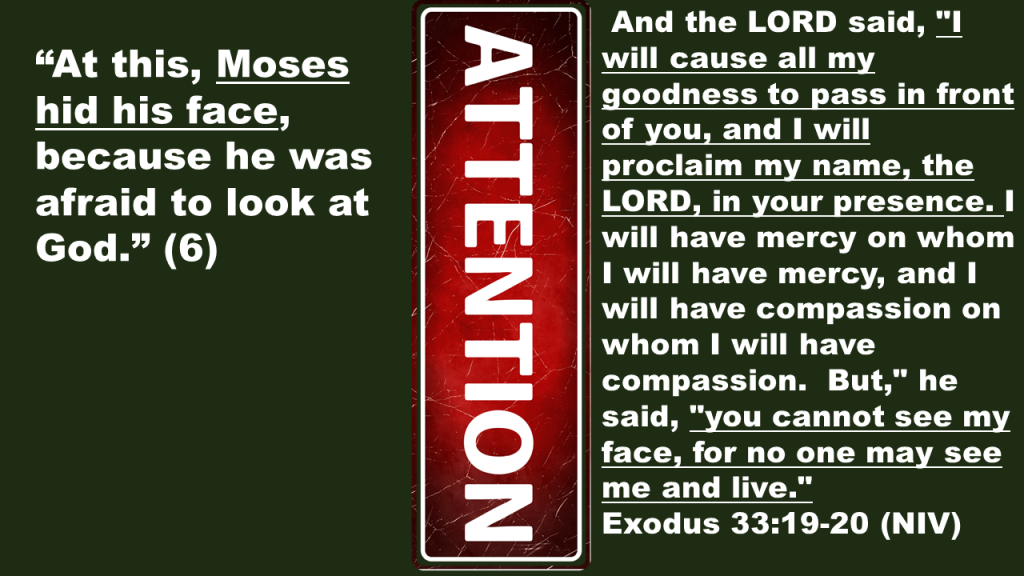 Verse 6 says, “At this, Moses hid his face, because he was afraid to look at God.” (You might say, now God had his full attention! But are his sandals on or off? This hiding of the face thing continues as we saw a couple of weeks ago even down to the Mount of Transfiguration and is pretty well a common reaction of humans to the supernatural.
Verse 6 says, “At this, Moses hid his face, because he was afraid to look at God.” (You might say, now God had his full attention! But are his sandals on or off? This hiding of the face thing continues as we saw a couple of weeks ago even down to the Mount of Transfiguration and is pretty well a common reaction of humans to the supernatural.
Later on Moses will learn that it’s good not to stare God down when God tells him, “you cannot see my face, for no one may see me and live.” (Ex 33:20). But somehow Moses instinctively knew that a gesture of humility before God was the right one to make at that time.
Then, after having Moses full undivided attention, “The LORD said, “I have indeed seen the misery of my people in Egypt. I have heard them crying out because of their slave drivers, and I am concerned about their suffering. So I have come down to rescue them from the hand of the Egyptians and to bring them up out of that land into a good and spacious land, a land flowing with milk and honey–the home of the Canaanites, Hittites, Amorites, Perizzites, Hivites and Jebusites. And now the cry of the Israelites has reached me, and I have seen the way the Egyptians are oppressing them. So now, go. I am sending you to Pharaoh to bring my people the Israelites out of Egypt.” Exodus 3:7-10 (NIV).
Surely God has the right man for the job. After all we’ve already established that Moses was raised by Pharaoh’s daughter. Who better for the job than an Israelite that was raised Egyptian, right?
 But look at Moses response! “… “Who am I, that I should go to Pharaoh and bring the Israelites out of Egypt?” Exodus 3:11 (NIV) This answer is certainly not like what Isaiah said, “Here I am, send me” (Isaiah 6:8). It’s just the opposite. Though Moses said, “Here I am” he was literally saying and would say again to God directly, “send someone else”.
But look at Moses response! “… “Who am I, that I should go to Pharaoh and bring the Israelites out of Egypt?” Exodus 3:11 (NIV) This answer is certainly not like what Isaiah said, “Here I am, send me” (Isaiah 6:8). It’s just the opposite. Though Moses said, “Here I am” he was literally saying and would say again to God directly, “send someone else”.
Why such a response from this man who obviously has generational faith to draw upon?
To answer that question you need more of HIStory. You need to read how Moses had already tried to help those very people. How he fled from Pharaoh’s court escaping the death penalty some forty years earlier for having killed an Egyptian who was beating an Israeli. You’ll see how that gesture of support on Moses side was not only rejected but mocked by the same people God was now sending him to deliver.
This answer was not spontaneous rejection of an idea, it was forty years of agonizing over what went wrong that took him from, enjoying a life of leisure in, Pharaoh’s court to herding someone else’s sheep in a mountain meadow and of course responding to a talking bush.
You will also find that having grown up in Pharaoh’s court meant that Moses was a well-educated man who enjoyed the finer things of Egypt. Until the day he let pride and anger get the best of him.
Moses knew he had blown it back then in a fit of rage. He knew what evil he was truly capable of having killed a man and burying his body to cover it up.
Moses was not being irreverent nor was this the answer of a tired old man full of self-doubt. Though it may well have been those feelings being inadequate to do the job that we all experience at times.
Moses question truly pondered how a man with his past performance record could be given such an opportunity and huge responsibility. “Who was he, that he should go to Pharaoh and bring the Israelites out of Egypt?”(11).
 And God immediately answered his query,… “I will be with you.” Like don’t worry! It’s not like I’m expecting you to go it alone. “I will be with you!”(12) Those worries, and regrets, past failures, the baggage Moses not only packed but carried all those years was not an issue with God!
And God immediately answered his query,… “I will be with you.” Like don’t worry! It’s not like I’m expecting you to go it alone. “I will be with you!”(12) Those worries, and regrets, past failures, the baggage Moses not only packed but carried all those years was not an issue with God!
Though this was a new calling to an old place it came with a new promise! The God of the universe, God of his fathers, Abraham, Isaac, and Jacob, who never left them despite their imperfections would not leave Moses alone. The God Who makes bushes light up and talk would be with Moses every step of the way? What more could Moses ask for? With God for him who could stand against him?
Isn’t that just the same as Jimmy ended last week’s message? Jesus Christ had given the disciples their marching orders: “…go and make disciples of all nations, baptizing them in the name of the Father and of the Son and of the Holy Spirit, and teaching them to obey everything I have commanded you. And surely I am with you always, to the very end of the age.” Matthew 28:19-20 (NIV). It’s your calling and my calling regardless of our season of life, regardless of the disappointments and failures we’ve experienced along the way. The command and calling and even the promise remain the same. “He will never leave you nor forsake you” (cf. Heb 13:6) for you have been called for a divine purpose.
“Namely, that God was in Christ reconciling the world to Himself, not counting their trespasses against them, and He has committed to us the word of reconciliation. Therefore, we are ambassadors for Christ, as though God were making an appeal through us; we beg you on behalf of Christ, be reconciled to God” (1 Cor. 5:19-20).
God sent Moses to reconcile His people and bring them out of bondage. But to what purpose? So they could live high on the hog? Or so that they could trade places with the Egyptians and be cruel masters?
Well as I saw it in our passage the words just leapt off the page. See if you they do for you?
“And this will be the sign to you that it is I who have sent you: When you have brought the people out of Egypt, you will worship God on this mountain.” Exodus 3:12 (NIV). Did you get it? Did they leap for you? The purpose of our salvation and deliverance from evil is worship! The sign of Mose’s legacy was when the people rescued from Egypt enjoyed a mountaintop experience with God.
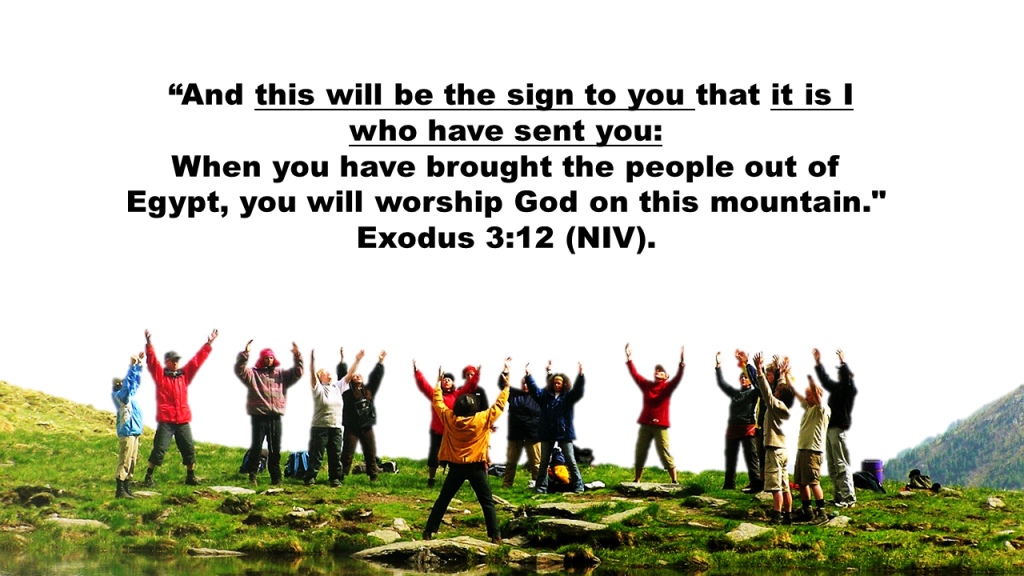 Two millennial later a woman and Jesus were having a chat one day. The conversation quickly went deep. Deep as only God can do. The woman had lived a tough life. Married four times and was currently living with a man who was not her husband. She was pretty messed up and feeling real uncomfortable about her life but all of that was about to change as she heard from the Master this same purpose for her life.
Two millennial later a woman and Jesus were having a chat one day. The conversation quickly went deep. Deep as only God can do. The woman had lived a tough life. Married four times and was currently living with a man who was not her husband. She was pretty messed up and feeling real uncomfortable about her life but all of that was about to change as she heard from the Master this same purpose for her life.
The woman said to Jesus, “Our fathers worshiped on this mountain, but you Jews claim that the place where we must worship is in Jerusalem.” Jesus declared, “Believe me, woman, a time is coming when you will worship the Father neither on this mountain nor in Jerusalem.
You Samaritans worship what you do not know; we worship what we do know, for salvation is from the Jews. Yet a time is coming and has now come when the true worshipers will worship the Father in spirit and truth, for they are the kind of worshipers the Father seeks. God is spirit, and his worshipers must worship in spirit and in truth.” John 4:20-24 (NIV).
The truth is worship is a burning desire God has placed deep within us but unless you choose to walk towards that burning bush and investigate it, you will never hear your name spoken by God nor realize when it’s time to take off your sandals and experience Holy Ground. But when you do worship God in spirit and in truth, you know you are leaving a legacy that transcends time.


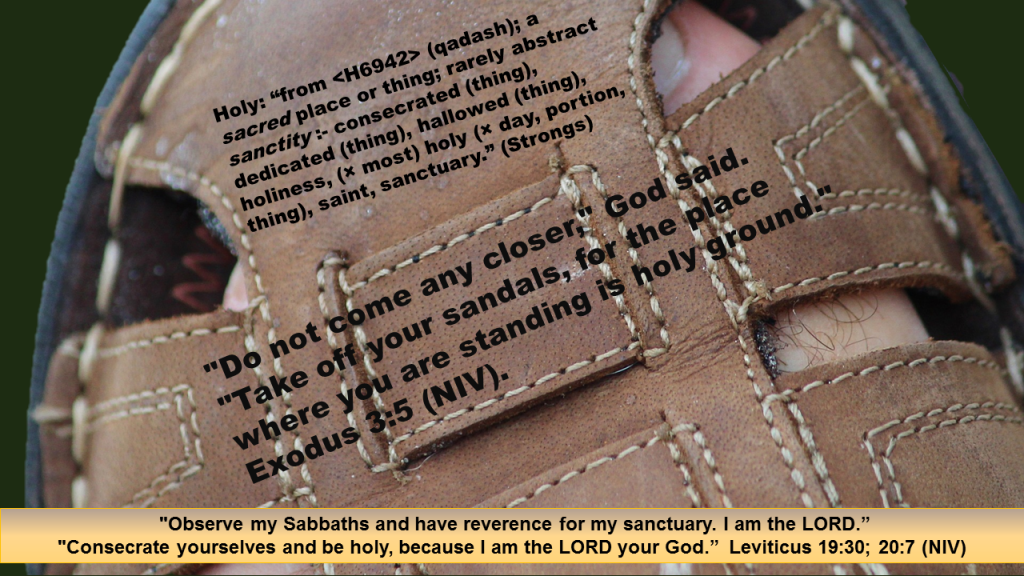
You must be logged in to post a comment.